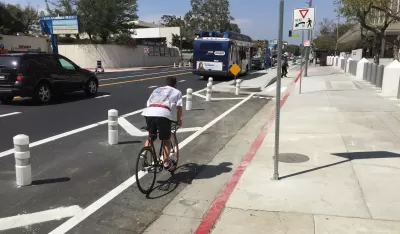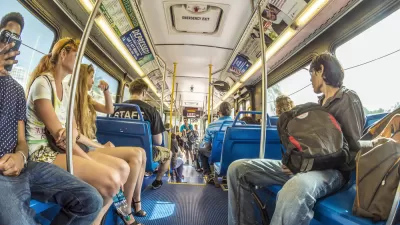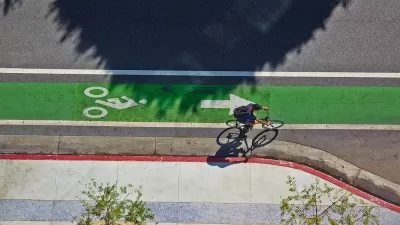L.A. has a plan for improving mobility. Why are city leaders ignoring it?

In an Los Angeles Times op-ed, Streets for All founder Michael Schneider writes that Los Angeles City Council members are "actively ignoring" the goals and actions laid out in the city's mobility plan that would encourage multi-modal transportation and reduce carbon emissions. The councilmembers' "persistent hostility toward the bike and bus lanes envisioned by that plan," Schneider says, affects all L.A. residents, not just those who use public transit or bicycles. By encouraging more sustainable forms of transit, city leaders could improve air quality and reduce congestion, benefiting everyone.
With nearly year-round perfect weather, a relatively flat city and an average trip of three miles, L.A. could get tens of thousands of cars off the road quickly, just by implementing its own plan and building the right infrastructure for car alternatives.
Today, bike lanes are installed in small, disconnected segments, often dumping riders onto busy streets with no protection. With cars accounting for 28 percent of greenhouse gas emissions in California, Schneider argues that local politicians should stop kowtowing to constituents who don't want to give up their cars and work to implement the recommendations in the mobility plan. Schneider advocates for citywide policy and implementation that would create a comprehensive and useful transportation network for cyclists and transit riders and help the city take concrete steps toward its climate goals.
FULL STORY: Op-Ed: L.A. can no longer afford to push bikes and buses aside

Maui's Vacation Rental Debate Turns Ugly
Verbal attacks, misinformation campaigns and fistfights plague a high-stakes debate to convert thousands of vacation rentals into long-term housing.

Planetizen Federal Action Tracker
A weekly monitor of how Trump’s orders and actions are impacting planners and planning in America.

Chicago’s Ghost Rails
Just beneath the surface of the modern city lie the remnants of its expansive early 20th-century streetcar system.

Bend, Oregon Zoning Reforms Prioritize Small-Scale Housing
The city altered its zoning code to allow multi-family housing and eliminated parking mandates citywide.

Amtrak Cutting Jobs, Funding to High-Speed Rail
The agency plans to cut 10 percent of its workforce and has confirmed it will not fund new high-speed rail projects.

LA Denies Basic Services to Unhoused Residents
The city has repeatedly failed to respond to requests for trash pickup at encampment sites, and eliminated a program that provided mobile showers and toilets.
Urban Design for Planners 1: Software Tools
This six-course series explores essential urban design concepts using open source software and equips planners with the tools they need to participate fully in the urban design process.
Planning for Universal Design
Learn the tools for implementing Universal Design in planning regulations.
planning NEXT
Appalachian Highlands Housing Partners
Mpact (founded as Rail~Volution)
City of Camden Redevelopment Agency
City of Astoria
City of Portland
City of Laramie





























